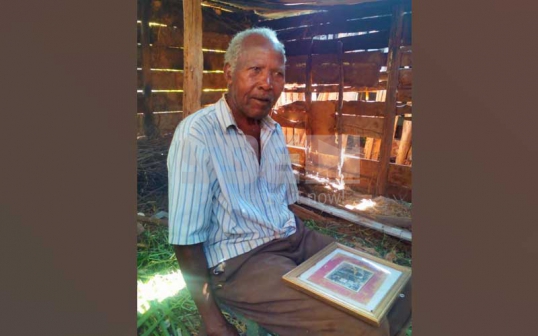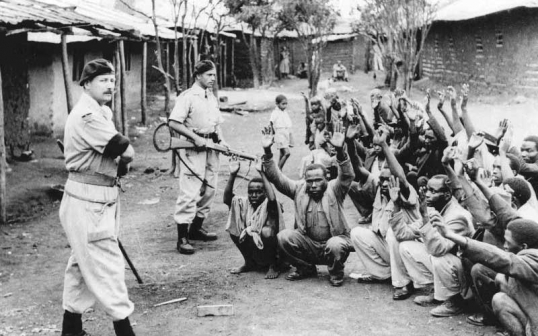
In Central Kenya, the arena of Kenya’s ‘war’ for independence, families of Mau Mau freedom fighters hardly marry from those suspected to have been Home Guards - collaborators who worked for the British colonial government.
It is not flattering for one’s family to be referred to as ngati, a Kikuyu corruption for ‘Home Guard,’ who were hated as much as the colonial chiefs.
That ngati and families of colonial chiefs benefited the most before and after uhuru, while Mau Mau descendants still languish in abject poverty despite fighting for ithaka na wiyathi (land and freedom), has not helped matters. These feelings of disapproval have not dissipated over 50 years after independence, whose attainment is celebrated as Jamhuri Day on December 12.
Indeed, the British colonial government would not have been able to suppress the Mau Mau uprising without the help of Home Guards - the “trained forces of local resistance” and part of the over 20,000-strong colonial force comprising the King’s African Rifles, the British Regiment of white military personnel, the Kenya Regiment of volunteer settlers and the Kenya Police.
Home Guards were sourced from the Tribal Police and private guards watching over the equally-hated chiefs who needed round-the-clock protection from the Mau Mau militia in the Mt Kenya region.
Home Guards were trained by the Kenya Police and the Kenya Police Reserve units and tasked with “winkling” the Mau Mau “out and forcing them into the open.” This is because the British Army was “powerless without the aid of the local Africans with intimate knowledge of the terrain,” as we are informed in The History of the Loyalists, a book released by the colonial government.
The Home Guards were carefully screened to ensure none had taken the Mau Mau oath.
Being a Home Guard came with a price. Murder, arson, cattle rustling, poisoning and random shooting were common. Being burnt alive and having their crops razed were the other dear penalties they had to pay. Chief Hinga of Nyeri, for instance, was shot in the mouth on December 28, 1952, four months after the State of Emergency was declared in Kenya by Sir Evelyn Baring following the cold-blooded murder of Senior Chief Waruhiu of Kiambu by Mau Mau adherents.
Mzee Jomo Kenyatta was arrested for “managing the Mau Mau,” which he had all along denounced.
One Home Guard who lived through it all is Mzee George Kuria Gachunga, 82. He has only one son who is 29.
After attending elementary school in his village in Kiambu County, he was made a Home Guard by the colonial government and placed under the district commissioner’s office from 1955 to 1963, before being appointed an Administration Police after uhuru.
He retired in 1985. He recalls that, “I became a Home Guard and was excited to serve the colonial government. I was given a pair of shorts, which had no pockets, and a belt. At the time, we were earned a Sh60 monthly salary. I used to patrol the villages to enhance security and to collect the hut and poll taxes. The people hated us, but we were agents of the British government and had to enforce the law even if our people didn’t like it”.
Kuria’s home in Ting’ang’a in Kiambu County has an old wired, square-shaped gate with overgrown grass at the entrance. The home is not fenced despite rampant insecurity in his area.
John Thiong’o, a neighbour and casual labourer at Mzee Kuria’s farm, says that the gate remains open throughout and “no one can dare enter Mzee’s house and steal because his level of intelligence is very high and people respect him because of his achievements both as a Home Guard and an Administration Police.”

Thiong’o, 30, adds that the story of Mzee Kuria having been a Home Guard is one they heard growing up, “so no one can dare steal from him. He is a good man but fearless”.
Mzee Kuria remembers that being selected to be a Home Guard was “a bit tedious as the colonial masters wanted someone with well-toned muscles and a rugged face that would depict authority. When we finished training, we were given shorts, belts and guns. There was no way you could wear trousers, as only the whites were supposed to wear them. Remember that the white man was cunning and he used us to serve his interests through indirect rule”.
Though Home Guards are held in suspicion bordering on disdain, Mzee Kuria told The Nairobian that, “I don’t regret working for the colonial masters because my success is pegged on that job. I own several plots in Nairobi,a borehole, live in a stone house which I built with the help of the colonial masters, and as you can see, I tend to my cows and goats. It’s through that job that I became a policeman after being absorbed by (Mzee Jomo) Kenyatta’s government. In 1970, there was no way you could get Sh2,100, but I was lucky to be able to raise that amount and invested the money in Marurui, where I also bought a piece of land”.
Marurui is now an upscale residential area bordering Garden Estate and Windsor Golf and Country Club in Nairobi.
Mzee Kuria dismisses the notion that children of Home Guards received preferential treatment.
“Don’t be cheated that our children are successful because we got favours from the British colonial government. For instance, every child had an equal opportunity to enroll in schools, but many considered education as a curse,” he says, adding that “we as the chief’s knew that education was a pillar for our children’s success in future and that’s why we forced them to go to school”.
Home Guards never saw eye-to-eye with the Mau Mau as they “hated us with a passion,” explains Mzee Kuria. “They felt we were the ones who betrayed them to the colonial masters. During those days, you had to be strict and firm and keeping law and order was our responsibility, but we also minded the welfare of our people. It was difficult to balance the loyalty to the colonial master and at the same time maintain a stable relationship with the people”.
Josephine Njoki Warueno, whose husband, Mzee Warueno, was a colonial chief in Kangema, Kiangonyi Murang’a County, explains that the rift between the Mau Mau freedom fighters and the British was orchestrated to bring create bad blood between the fellow Africans so that they could rule without difficulties.

“My late husband was a colonial chief and for sure, we enjoyed certain privileges, such as admission of our children to schools and receiving gifts from the mzungu. He was in charge of keeping law and order though he never used to disclose information to me because he was under oath. To get along with the British colonial government was simple and clear, abide by their rule and enjoy the riches, challenge them and face the music”, explains Njoki, now 102 years.
She adds that the rift between Mau Mau and colonial chiefs affected marriages as some “parents could not allow their children to be married in the colonial chiefs’ homes, and this was what the colonial masters wanted because unity would result in an unstoppable revolt that could destabilise their rule.
Stigmatisation from both sides became a hindrance to many potential marriages.” The granny adds that, “This hatred was deep-rooted and you can tell that up to date, families that are regarded to have colonial roots are not respected in society and it’s high time we end it. Let us open a new chapter and refrain from these ideologies that were planted by the white man”.
 The Standard Group Plc is a multi-media organization with investments in media
platforms spanning newspaper print
operations, television, radio broadcasting, digital and online services. The
Standard Group is recognized as a
leading multi-media house in Kenya with a key influence in matters of national and
international interest.
The Standard Group Plc is a multi-media organization with investments in media
platforms spanning newspaper print
operations, television, radio broadcasting, digital and online services. The
Standard Group is recognized as a
leading multi-media house in Kenya with a key influence in matters of national and
international interest.









